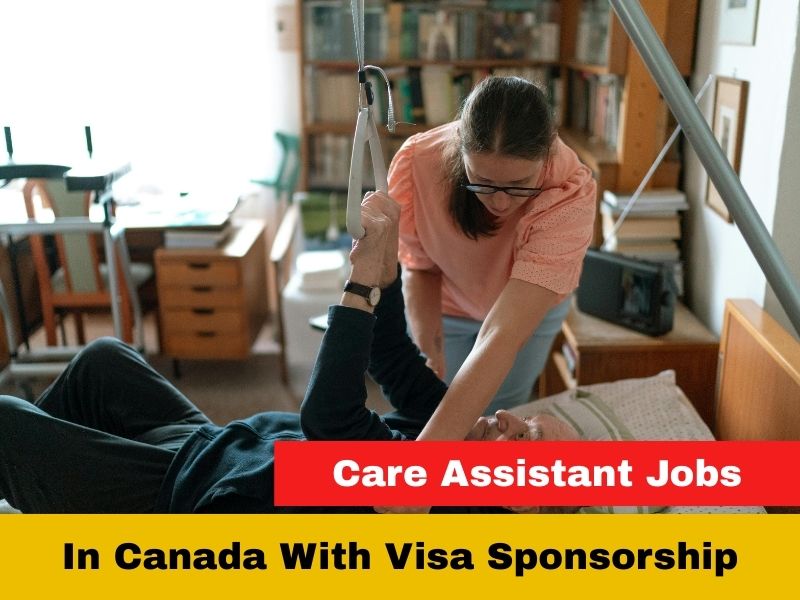In 2025, Canada continues to open its doors to compassionate individuals from around the world, seeking to fill the growing demand for care assistants. With an aging population and a healthcare system in need of dedicated support, opportunities abound for those ready to make a meaningful impact.
For many international applicants, the prospect of working in Canada as a care assistant is not just a career move—it’s a chance to embark on a life-changing journey. The Canadian government recognizes this need and offers various visa sponsorship programs to attract skilled caregivers globally. Whether you’re experienced in personal support, elderly care, or home health assistance, there’s a place for you in Canada’s healthcare landscape.
This comprehensive guide aims to navigate you through the pathways to securing a care assistant position in Canada with visa sponsorship. From understanding the roles available to grasping the eligibility criteria and application processes, we’ll provide you with the essential information to take the next step in your caregiving career.
Why Canada Needs Foreign Care Assistants
Canada’s demographic landscape is shifting, with a significant portion of its population entering retirement age. This transition has led to an increased demand for healthcare services, particularly in home care and support. According to the Government of Canada, the need for caregivers is rising, and international workers are being welcomed to fill these essential roles.
The shortage of local caregivers has opened doors for foreign applicants to contribute meaningfully to Canadian society. By providing care to the elderly, individuals with disabilities, and those requiring daily assistance, international care assistants play a vital role in maintaining the well-being of communities across the country.
Types of Care Assistant Roles Available
Canada offers a variety of caregiving positions to suit different skills and experiences:
- Personal Support Worker (PSW): Assist clients with daily activities, personal hygiene, and mobility.Home Support Worker: Provide household assistance, meal preparation, and companionship.
- Live-in Caregiver: Reside with clients to offer round-the-clock care and support.
- Child Caregiver: Focus on the developmental and daily needs of children in a home setting.
- Elderly Caregiver: Specialize in caring for senior citizens, addressing their unique health and emotional needs.
- Home Health Aide: Offer medical and personal care under the supervision of healthcare professionals.
- Nursing Aide: Support nurses in hospitals or care facilities with patient care tasks.
These roles are integral to Canada’s healthcare system, providing essential services that enhance the quality of life for many individuals.
Salary Expectations by Role and Region
Salaries for care assistant positions in Canada vary based on role, experience, and location. Here’s an overview:
| Role | Average Annual Salary (CAD) |
|---|---|
| Personal Support Worker | $30,000 – $45,000 |
| Live-in Caregiver | $25,000 – $38,000 |
| Home Health Aide | $28,000 – $40,000 |
| Nursing Aide | $32,000 – $47,000 |
| Child Caregiver | $27,000 – $41,000 |
| Elderly Caregiver | $30,000 – $44,000 |
These figures can fluctuate depending on the province and the specific employer. Urban areas may offer higher salaries due to the cost of living, while rural regions might provide additional benefits such as accommodation.
Eligibility Criteria for International Applicants
To qualify for care assistant positions in Canada with visa sponsorship, applicants typically need to meet the following requirements:
- Educational Background: A minimum of a high school diploma; additional certifications in caregiving or healthcare are advantageous.
- Work Experience: At least one year of relevant experience in caregiving or a related field.
- Language Proficiency: Demonstrated ability in English or French, often through standardized tests like IELTS or TEF.
- Certifications: First Aid and CPR certifications are commonly required.
- Background Checks: A clean criminal record and a medical examination to ensure the ability to perform caregiving duties.
Meeting these criteria is essential for both employment and visa application processes. Prospective applicants should ensure all documentation is accurate and up-to-date.
Visa Sponsorship Programs for Care Assistants
Canada offers several immigration pathways for care assistants seeking employment with visa sponsorship:
- Home Child Care Provider Pilot: Designed for caregivers who provide in-home child care. Applicants must have a job offer and meet specific eligibility criteria.
- Home Support Worker Pilot: Targets individuals caring for seniors or persons with disabilities. This program also requires a valid job offer and fulfillment of eligibility requirements.
- Temporary Foreign Worker Program (TFWP): Allows Canadian employers to hire foreign nationals to fill temporary labor shortages, including caregiving roles.
- Provincial Nominee Program (PNP): Enables provinces and territories to nominate individuals for permanent residence based on local labor market needs. Some PNP streams are tailored for healthcare workers, including care assistants.
Each program has specific application procedures and requirements. Applicants should consult the official Immigration, Refugees and Citizenship Canada (IRCC) website for detailed information.
Top Employers Offering Visa Sponsorship
Canada is home to a wide array of reputable healthcare organizations actively recruiting care assistants from abroad. These companies not only provide competitive salaries and benefits but also assist successful candidates with visa sponsorship and relocation.
Bayshore Home Health
A national leader in home and community healthcare services, Bayshore regularly hires personal support workers (PSWs) and home health aides across the country. The company values multicultural talent and often helps with visa paperwork for skilled caregivers.
ParaMed
Operating since 1974, ParaMed is one of the largest providers of home care and nursing support services in Canada. Their caregiver recruitment often includes opportunities for international candidates.
Home Instead Senior Care
Known for its personalized approach to elderly care, Home Instead has franchises throughout Canada. They frequently recruit overseas workers under caregiver immigration pilots.
Sienna Senior Living
Operating more than 70 senior living residences, Sienna hires healthcare aides, PSWs, and nursing assistants. They’ve been part of various skilled foreign worker programs.
Revera Inc.
A trusted name in senior living and long-term care, Revera supports international hires and partners with immigration consultants for smoother onboarding.
Extendicare
This organization provides long-term care, rehabilitation, and home health services. With facilities across multiple provinces, Extendicare frequently looks abroad to find qualified care assistants.
CanadianNanny.ca
Although more of a job board, this platform connects caregivers and families across Canada. Many employers on the site are open to hiring and sponsoring foreign caregivers.
Application Process: Step-by-Step Guide
To secure a care assistant job with visa sponsorship in Canada, follow these essential steps:
Prepare Your Resume and Cover Letter
Customize your CV to meet Canadian formatting standards. Highlight relevant caregiving experience, certifications, language skills, and your adaptability. A clear, concise cover letter should express your enthusiasm and suitability for caregiving roles in Canada.
Interview Preparation
Expect employers to conduct video interviews. Common topics include your caregiving philosophy, past challenges, availability, and understanding of Canadian care standards.
Secure a Job Offer
This is the most crucial step. Most visa streams require a valid job offer before applying for a visa.
Apply for the Appropriate Visa Program
Depending on your job type and employer, you’ll apply for one of the following:
- Home Child Care Provider Pilot
- Home Support Worker Pilot
- Temporary Foreign Worker Program
Full visa application instructions can be found on the official IRCC website.
Challenges and Considerations
Working as a care assistant in Canada, especially as an international worker, comes with both opportunities and challenges.
Cultural Differences
Adapting to Canadian norms of politeness, privacy, and personal space may take time. Familiarize yourself with Canadian culture to help bridge gaps in expectations.
Physical Demands
Caregiving often requires lifting, standing for long periods, and emotional resilience. Ensure you are mentally and physically prepared.
Workplace Expectations
Punctuality, professionalism, and continuous improvement are valued. Some roles may require working nights, weekends, or holidays.
Legal Protections
Foreign workers are protected under Canadian labor laws. Learn your rights regarding wages, rest days, working hours, and safety. You can refer to the Canadian Labour Program for more information.
Resources and Support Networks
Navigating a new job and life in Canada is easier when you know where to turn for help.
Canadian Caregivers Association (CCA)
An organization that provides advocacy, networking, and legal support for caregivers in Canada.
Immigration Services Association of Nova Scotia (ISANS)
Offers settlement services, language training, and employment guidance for immigrants, including caregivers.
Settlement.Org
A trusted information hub offering guidance on healthcare, education, housing, and employment for newcomers.
Local Community Centres and Faith Groups
Many newcomers find support through local churches, mosques, temples, and cultural associations that offer social integration programs.
Conclusion
If you’ve been dreaming of a career that not only uplifts others but also sets you on a path to personal and professional growth, then care assistant jobs in Canada with visa sponsorship could be the opportunity you’ve been waiting for.
Canada continues to value the essential contributions of caregivers, recognizing their role in supporting families, seniors, and the healthcare system at large. Whether you’re caring for children, the elderly, or individuals with special needs, your skills are in high demand.
By following the steps in this guide—from choosing the right visa program to connecting with reputable employers—you can confidently pursue your dream of working and living in Canada. Not only will you find meaningful work, but you’ll also become part of a diverse and welcoming society that thrives on compassion, dedication, and care.




Leave a Comment